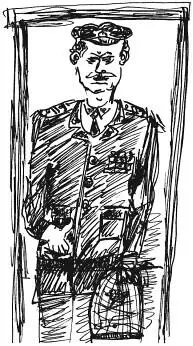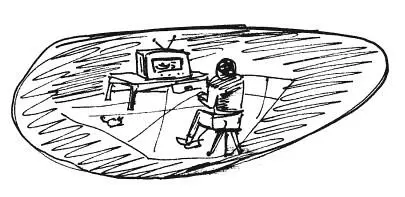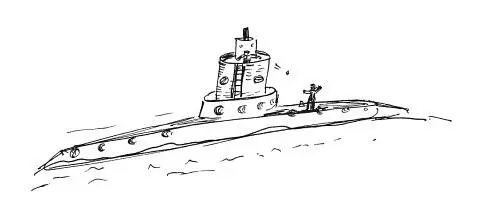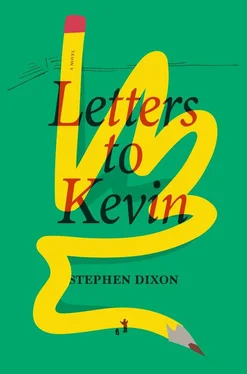“Come to the point.” “Fire away then, captain. I’m ready.” “First question,” he said, “is what floor does my Aunt Belle Mae de Momma Devine live on in her high-rise tenement house in Tashkent, Uzbekistan?” “I was wondering what that guy who brought me here said about giving my best to her.” “Correct. Second question is how many pages are there still left in the world of all the books ever printed before and after the Mazarin Bible of 1456, though not including the Mazarin Bible or any book printed anywhere today?” “You joking?” I said. “Nobody could answer that.” “Right. Third question is what was the exact hour and date of the last time I had my galley painted, how many coats were put on, and what color did I originally choose?” “Hold it a second. I was told you’d ask three different questions than these.” “You’re right. Ready for the fourth question?” “I thought there’d only be three.” “Right again. You’re doing fine. What do you think the fifth question will be?” “How the heck should I know?” “Splendid. You answered my five questions precisely right. Now when do you want to leave?” “Is that your sixth question?” “That’s right. Can’t fool you. You answered it correctly too. Would you like to be underway tonight?” “Is that your seventh question?” “That your seventh answer?” “And was that your eighth question?” “That your eighth answer to it?” “It was.”
“And that was my ninth question. Shall we go?” “Let me think a moment what my answer should be.” “Don’t bother, you’ve just given it. Now are we off or not?” “I’m stumped on that last one.” “No need to be, as I only give ten questions.” “Then let’s get started right away,” I said. “Wonderful. Can you hold my cage?” “I’m sorry, but I’m allergic to birds.” “Good thing also. As I actually do give eleven questions and you just answered the eleventh perfectly.” He set the cage down on the doormat and went into the house. “You leaving the canary outside?” I said. “I can’t take it with us. She has very bad sea legs and her ears don’t pop when we submerge. But she’ll be okay. My wife Wilma will be home shortly, and the bird’s legally hers.” “I thought it was your son Dewey’s.” “We don’t have a son Dewey, do you?” He led me to the basement, lifted a rug up and opened a trapdoor beneath. We climbed down a ladder and through the conning tower of his waiting submarine. He sealed the hatch and told me to sit tight and comfort Our Country till we were safely out to sea and could surface. Then he spun a number of hand wheels and worked several panelboards of switches, buttons and circuit breakers, while he shouted at Our Country and me “Rig for diving… Ventilate inboard… Flood main ballast… Pound in after trim and secure the main induction,” and we were underway.

There isn’t much to say about the voyage. It took thirteen days. The food was always cooked in its can by the captain and served cold. Once we left the Atlantic for the St. Lawrence Seaway, we were underground or underwater all the time. There were no books. Islept a lot, looked after the cat, and watched videos of the same three war movies over and over again, on a tiny TV screen. I eventually knew the dialogue so well that for something else to do, I ran the films silent and spoke all the parts. And then only played the films’ soundtracks and acted out all the roles, including the radiotelegraph sets. Throughout the trip there was nothing to see in the periscope but the same pink eye of a very large fish looking back. And nothing to see through the bubbletop glass from my bedroom and bathtub but the body of that one-eyed fish who was either swimming along with us or got caught on something the whole way.
Starting from Chicago, a New York newspaper was dropped down a snorkel every morning in time for our breakfast. It was my job to fetch the paper from the intake tube and cut out for the captain all the articles about shipping and the sea. I once asked who was delivering the newspaper. He said “Who do you think? Newsboys who pitch it with perfect aim at our snorkel as they ride by above on their bikes.” I said “You’re of course not saying it’s newsboys who are delivering it, right?” “No,” he said. “Instead it’s a porpoise with an octopus on her back, which she has dunking the newspaper down to us after they finish reading it, Ach, how little you landlubbers know about snorkeling and seamanship.” One day I asked him how he had come upon this extraordinary route to the Pacific. He said “I was in Lake Michigan near Chicago one night and got lost underwater when I fell asleep at the controls. When I finally could surface again without smashing the conning tower on the land overhead, I found myself in the San Francisco Bay. ‘So, Captain,’ I told myself then. ‘You’ve discovered a transcontinental route more important than anything Balboa or Lewis and Clark found, except you don’t know how you got here.’ To find that same route again I first had to go down the California coastline and through the Panama Canal and back up to the St. Lawrence Seaway and into Lake Michigan. There, at the same site where I fell asleep at the controls months before, Iblindfolded myself and submerged. I hoped I would get lost underwater again and end up in the San Francisco Bay. But it wasn’t that easy. Trial and error, that’s what serious exploration is. Plenty of dead ends, broken conning towers and underground rivers that sometimes led me back to where I was weeks before. Till one day I was in the Bay and could actually chart how I got there and how I could return to Lake Michigan through the same route.” “Why haven’t you told the Navy of this? I’m sure they’d love to know of a shorter submarine route to the Pacific and Atlantic than under the North Pole.” “If I told them, my route would be too crowded for me to go to San Francisco whenever I liked. Because it’s very narrow in places. Over some stretches, there’s room for only one small sub at a time.” Anyway, we got to California without trouble. We surfaced in the inlet off the San Francisco Bay where the Palo Alto Yacht Club connects up with the Palo Alto dump. The captain opened the hatch, said “Permission to leave is granted, Mr. Foy,” and asked if he should wait for me for the return trip home. “I think I’ll be staying a while, but many thanks.” “I hate going back alone. Maybe I’ll place an ad in the newspaper here for a return passenger. Though I don’t see how anyone will ever be as clever again to answer those impossibly tough questions I insist on asking for the ride.” “Get someone to give out the questions beforehand,” I said. “Like that man tried to do with me.” “Why not the man himself?” He took off the captain’s cap and put it in his pocket, took out of his other jacket pocket a folded-up fedora and put it on his head. Then he turned his jacket inside out, where it became a shabby windbreaker with a wine bottle sticking out of a side pocket, put the windbreaker on and pulled off a thin rubber mask I didn’t know he’d been wearing all this time, and threw the mask into the water.


And there, standing on the conning tower and waving at me, was the same man who gave me the three wrong answers to the captain’s eleven questions thirty-one days ago. “It’s been you all along,” I said. “Well, what I’d still like to know, sir, is how you knew about me and those pixies and logs and such?” He put the fedora back in his pocket, reversed the jacket and put the captain’s cap on his head, pulled off the man’s full-faced mask and threw it in the water, and underneath was the captain’s face again. “Captain,” I said. “First of all I want to thank you for a most enjoyable voyage. Secondly—” The captain switched hats, reversed the jacket, pulled off the captain’s mask and took a swig from the wine bottle and became the man again. “Oh there you are,” I said. “Well, I’d still like to know who tipped you off about those logs and pixies and me.” He switched hats and jackets and pulled off the mask of the man and threw it in the water and became the captain again. “Secondly, Captain,” I said, “is a complaint, though a minor one, about why you couldn’t provide better grub for supper but carrots and canned buttered rolls. Now for the meals on your return trip, might I suggest—” But he kept switching hats and jackets and pulling off the masks one after the other and throwing them in the water. Soon he was switching outfits so fast that at times he was the man wearing the captain’s hat and trying to put his arm in both sleeves of his jacket and other times he was the captain, guzzling from the wine bottle, with the man’s mask on his head and jacket and hats sticking out of his pants pockets. He only had two hats, but the masks he pulled off seemed to be endless. Maybe he started out wearing more than a hundred masks. And under the last one, which could be of either the captain or man, was the real face of the captain or man or of someone else. Or maybe there wasn’t a face under the last mask, but just one of those two hats on top of the high turtleneck collar covering his neck. And the real face was where his neck seemed to be. And the real neck was where his chest seemed to be and his chest was where his stomach seemed to be, and so on. Till his thighs were where his shins seemed to be and his shins were in his shoes where his feet would normally be. But then where would his feet be if his shins were inside his shoes? “Goodbye, Captain,” I said, when he seemed to settle on the real face of the captain and the captain’s clothes. “Goodbye, my boy. And keep in touch.” He pulled the mask off, switched hats and reversed jackets, but seemed too exhausted to stick his arms in the sleeves or straighten the fedora from its sideways position on his head. “Then goodbye, sir,” I said. “It’s been nice knowing you both.” “Same here,” the man said, “And best of luck to you.” He reversed the jacket, but only held it on his arm. Leaned forward to let the fedora fall off his head, slowly peeled off the mask to become the captain again, and smashed the bottle against the side of the conning tower and climbed down the ladder. From inside the tower he yelled “Stations for diving… Flood main vents… Shift the control and steady so and land ho and ahead,” and closed the hatch and the sub soon submerged. I walked to your house a couple miles away. Nobody seemed to be around. I rang the bell, knocked on the door, called out your name and your mom’s, but still no one answered. I at least thought your dog Saybean would bark or run up to me and knock me over, though maybe you’d taken him for a stroll.
Читать дальше















